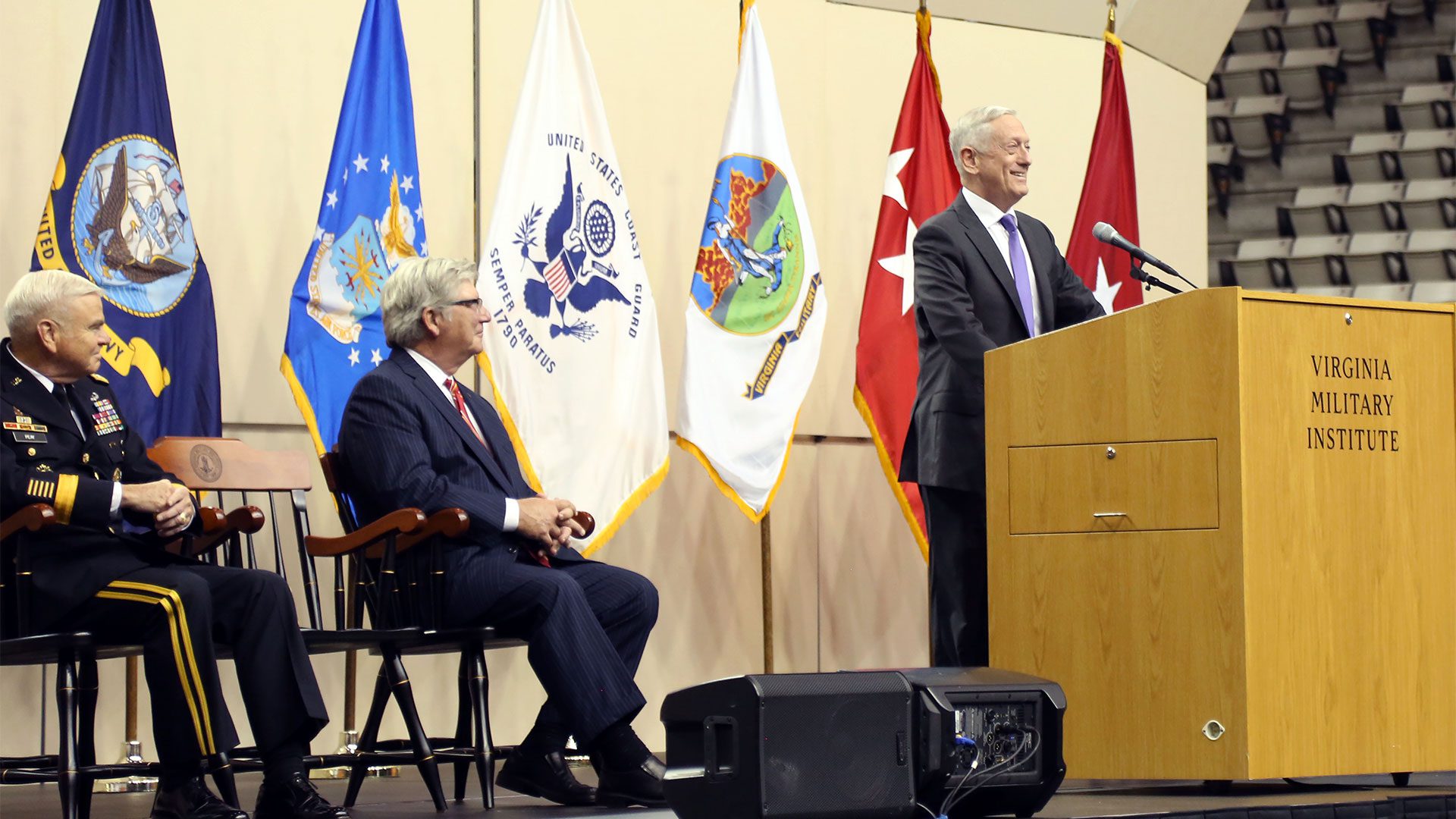Mattis Addresses Corps of Cadets

Secretary of Defense James Mattis addressed the Corps. Photo by Micalyn Miller, VMI Alumni Agencies.

Secretary of Defense James Mattis addressed the Corps. Photo by Micalyn Miller, VMI Alumni Agencies.
Exuberantly received by the VMI Corps of Cadets, U.S. Secretary of Defense James Mattis detailed the challenges cadets will soon face in a military – and a society – that needs leadership, allies and modernization. He is the third secretary of defense to speak at the Institute this century and spoke to cadets, faculty and staff in Cameron Hall Sept. 25, 2018.
Mattis, who enlisted in the Marine Corps in 1969 and has played a leadership role in multiple wars, defined the primary powers of American influence in the world – those of intimidation and inspiration.
To illustrate that power of inspiration, Mattis shared a story about one of the men who had failed to kill him over the years – an enemy engineer who was captured attempting to lay an improvised explosive device on the road Mattis was taking to a remote base overseas. Following the engineer’s capture, Mattis spoke with him.
“I want you all, especially you young people, to listen to me here. He said, ‘General, do you think if I’m a model prisoner, could I one day immigrate to America?’ Think about that.
“The hatred he felt was so much that he would go out and put a bomb in the road to kill us, but the example of America was so strong that if he could be sitting where you are today or have his son or daughter in that audience, he’d have given his eyeteeth,” said Mattis. “It wasn’t just because we caught him. This was deeper.”
Mattis reminded cadets that each of them are part of that legacy of inspiration and they must fight to defend it.
“You give up that moral and ethical high ground, that historic legacy that we carry with us, at our nation’s peril,” said Mattis. “So you hold that close. You take care of each other.”
He described the U.S. military as the first line of effort to keep the American experiment alive. Its purpose, he said, is to intimidate adversaries. It does that by being ready and willing to engage in the difficult, often vicious, aspects of war when called upon.
A second line of effort Mattis highlighted is maintaining and strengthening alliances.
“Anyone who reads history knows that nations with allies thrive, but nations without allies basically wither away,” he said. Mattis praised George Marshall, Class of 1901, for creating a plan to unite broken countries on both sides of the conflict following World War II.
“He extended a hand to our allies flattened in the war … but he also went to adversaries. Think of how vicious [the fighting] was,” he said. “Then he turns around and helps set up a plan to draw these nations back together into this community of nations.”
After rebuilding Europe, Marshall was also instrumental in establishing the North Atlantic Treaty Organization, something an Australian ambassador told Mattis was the “most sacrificial act in world history.”
However, he also noted that the U.S. is no longer in the post-World War II era when a devastated Europe was rebuilding. Mattis emphasized that those same countries now have substantial resources and should not rely on the U.S. to “carry the full burden.”
Mattis went on to say the U.S., as a nation, is still working on building something better. “We’re still building a nation; it’s hard work but noble work. Don’t ever think we are done. We are not perfect, but we will always strive to be better,” said Mattis. “We are stronger when we are together.”
In terms of building a better nation, VMI serves as the model for the skills U.S. society needs, including leadership and maintaining a “fighting stance,” Mattis said.
In addition to elaborating on policy and strategy details, Mattis drew a personal connection with members of the Corps, referring to them throughout the address as, “my fine young cadets,” and offering advice on how to engage with their subordinates after commissioning.
During a question and answer session, cadets asked questions on topics including the role of women in combat, vulnerabilities in cybersecurity, the U.S. military as a global police force and the need for a more physically fit society. Mattis encouraged cadets to take individual initiative to contribute to a stronger nation.
“We need some of you to be the Spartans at the gate, because we’re not going to hang onto these freedoms because our grandfathers fought,” said Mattis of the current state of physical fitness in the nation. “Every generation is going to have to fight to keep this experiment alive,” he continued. Mattis also spoke about the evolving nature of strategic challenges.
“How we protect the country was brought into stark relief on 9/11 … everyone in a uniform knew we had let down America on 9/11,” he said, emphasizing that U.S. defenses must remain adaptable to current threats.
Regarding cyber threats, Mattis proposed that a plan down the road might be offering government-backed cybersecurity solutions to private businesses.
Before leaving the stage to a standing ovation, Mattis gave the Corps a few final words to remember. “Every one of you could have picked an easier school to go to. Here are three words I leave with you to keep you from laying on a shrink’s couch at 45 wondering, ‘Where did my life go?’” said Mattis. “Put others first.”